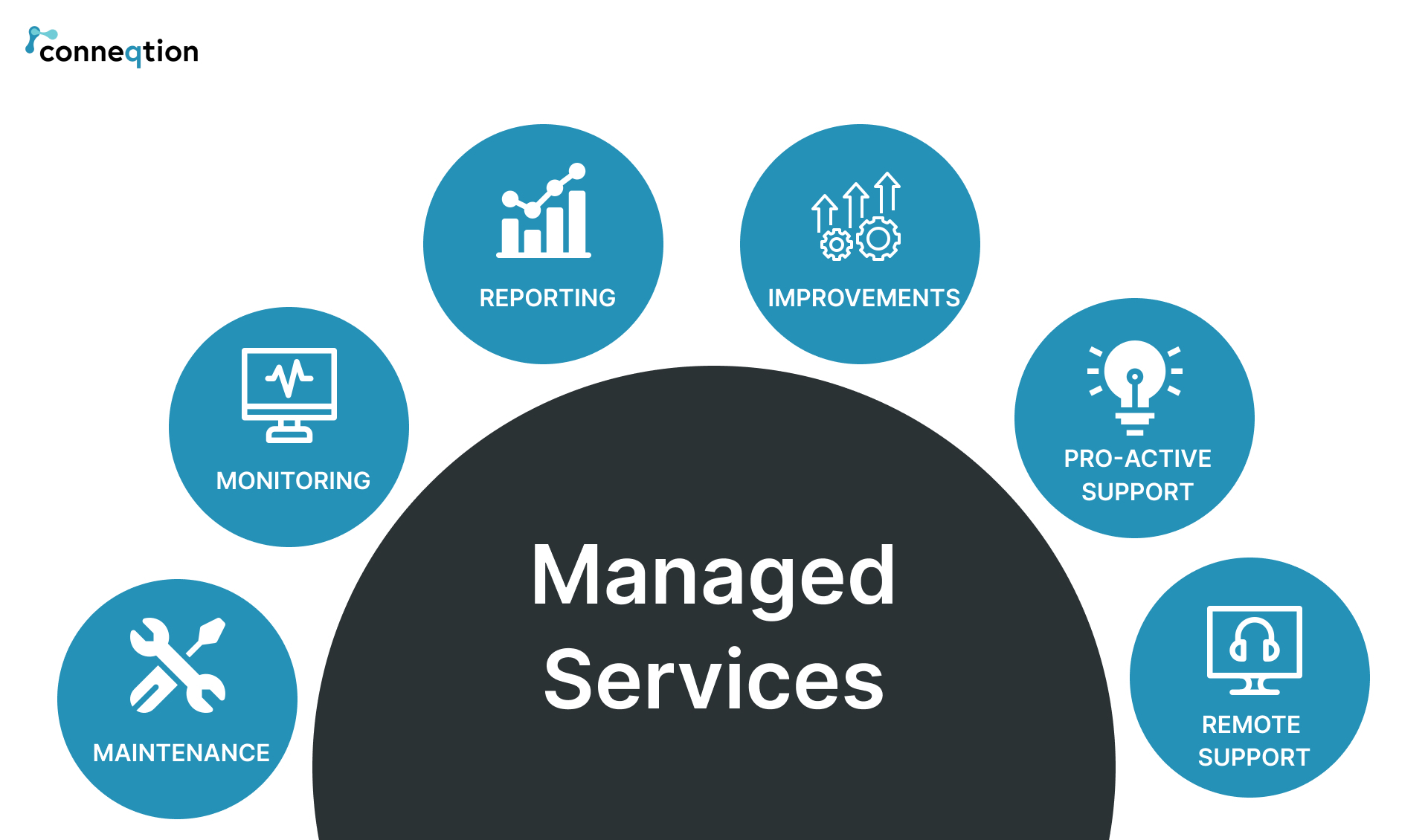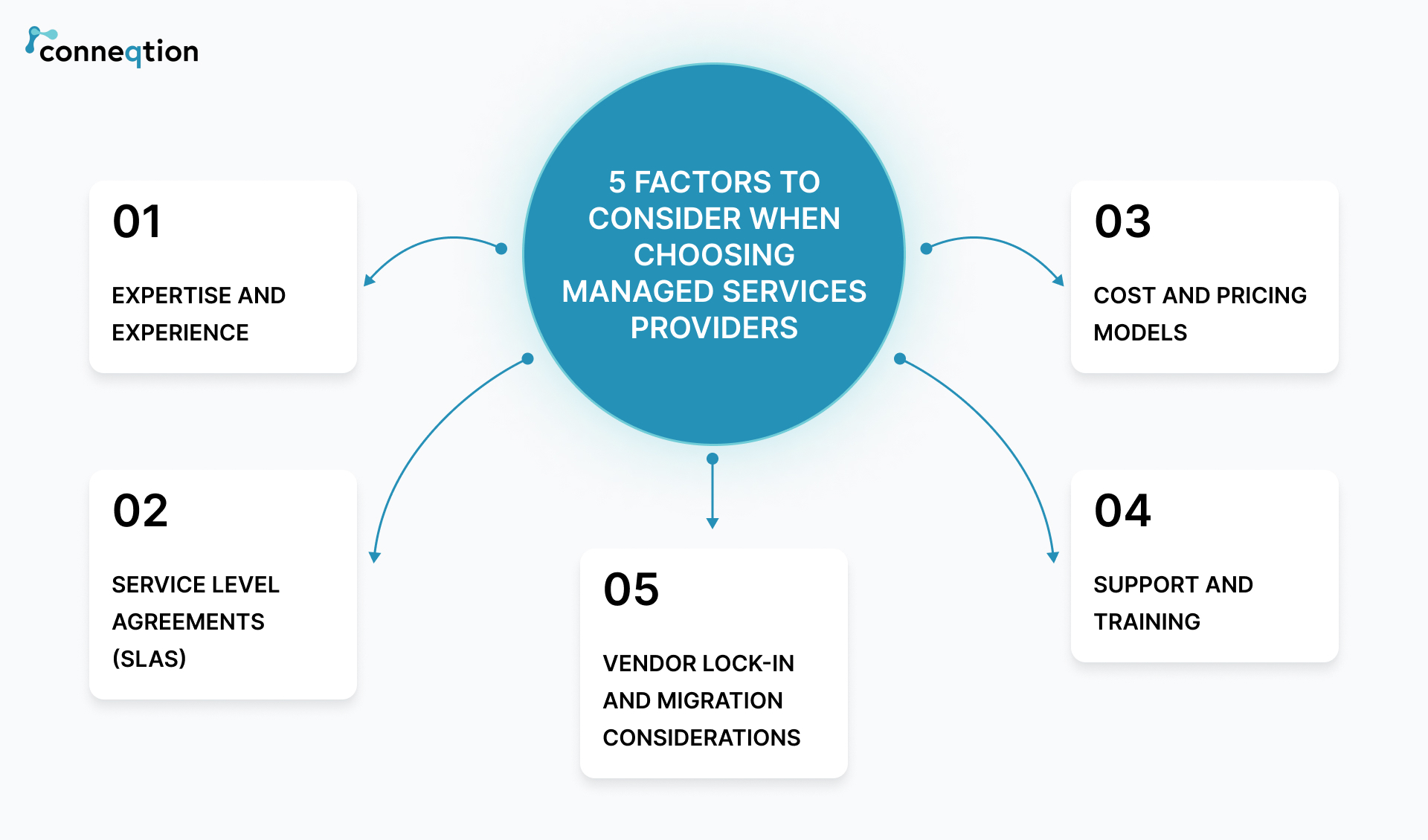According to a report by Grand View Research, the global managed services market was valued at USD 267.3 billion in 2022, and it is expected to grow at a compound annual growth rate of 13.6% from 2023 to 2030. So, the stats clearly denote how businesses can leverage their cloud investments. It provides expert support and management of cloud infrastructure. Also, managed services can offer a range of services to your business, and they’re specially designed to handle the daily operations of your applications.
Let’s look at how managed services can help cloud investments. Have a look at the below infographics.

Managed services can leverage cloud investments in three major ways:
Performance Optimization: MSPs can monitor and optimize cloud resources to ensure they are performing at their best. This includes monitoring resource utilization, identifying bottlenecks, and tuning configurations to improve performance.
Compliance: MSPs can help organizations comply with regulatory requirements and industry standards by implementing appropriate security controls, documenting policies and procedures, and conducting regular audits.
Disaster Recovery: Managed can provide disaster recovery services to ensure that critical applications and data are protected in the event of a disaster. This includes implementing backup and recovery solutions, testing disaster recovery plans, and ensuring that data is replicated to multiple locations.
Also read: What are managed services and how it helps enterprises?
Uses of managed services for cloud investments:
Managed services can provide several key benefits for organizations investing in cloud technologies, including:
Cost Savings: Managed services can help organizations reduce costs associated with managing and maintaining their cloud infrastructure, as they do not need to invest in additional hardware or software or hire and train additional staff.
Increased Efficiency: Managed services can provide organizations with access to specialized skills and expertise, enabling them to optimize their cloud infrastructure, automate routine tasks, and improve their overall efficiency.
Improved Security: Managed service providers can help organizations improve the security of their cloud infrastructure by implementing best practices and industry standards, such as encryption and access control, and by monitoring and addressing security threats and vulnerabilities.
Scalability: Managed services can help organizations easily scale their cloud infrastructure as their business needs change, without having to invest in additional resources or hardware.
24/7 Support: It typically provides round-the-clock support and monitoring, enabling organizations to quickly address any issues or incidents that may arise.
What to Look for When Choosing Managed Service Providers
Expertise and Experience: Look for MSPs with relevant expertise and experience in the specific cloud technologies and services you are using or considering. Consider their track record of success with similar clients and projects.
Service Level Agreements (SLAs): Review the MSP’s SLAs to ensure they align with your business needs, including availability, response times, and escalation procedures. Look for guarantees around uptime, performance, and security.
Analyze Cost and Pricing Models: Evaluate the MSP’s pricing models and fees to ensure they align with your budget and business objectives. Consider whether pricing is fixed, variable, or based on usage. Look for transparency around fees, including any additional costs for services, upgrades, or support.
Support and Training: Consider the level and quality of support and training provided by the MSP. Look for an MSP that offers round-the-clock support and provides clear documentation and training resources for your team.
Vendor lock-in and migration considerations Evaluate the MSP’s ability to work with multiple cloud providers and their expertise in migrating between cloud platforms if necessary. Consider whether the MSP has the flexibility to adapt to your changing business needs and technology choices.
Other factors to consider may include the MSP’s security and compliance capabilities, their data protection and recovery strategies, and their approach to managing and monitoring your cloud infrastructure. Be sure to thoroughly evaluate potential MSPs before deciding to work with them to ensure they meet your business requirements and can provide the support and services you need.

Types of managed services by size and responsibilities
Managed service providers can be categorized into different types based on their size and level of responsibility.
Small MSPs: These are typically small businesses with a few employees that provide basic IT services, such as network monitoring and maintenance, help desk support, and basic cloud management.
Medium MSPs: These are larger companies with more employees and resources that provide a wider range of services, such as server and application management, security and compliance, and data backup and recovery.
Enterprise MSPs: These are larger MSPs that serve large organizations or enterprises, providing a wide range of services across multiple locations, often with global coverage. They offer more advanced services, such as virtualization, cloud management, and big data analytics.
Vertical MSPs: These MSPs specialize in serving specific industries, such as healthcare, finance, or retail. They have a deep understanding of the unique IT requirements and regulatory compliance issues of these industries.
Specialized MSPs: These MSPs specialize in specific technologies or services, such as cybersecurity, data backup and recovery, or cloud migration. They provide highly specialized services and expertise in a particular area.
Conneqtion Consulting for Managed Services
Managed services can help you do your job much easier. Conneqtion Group has a team of experienced professionals with expertise in managing complex IT environments that can provide services across the US and India. We use advanced technologies and tools to provide their managed services, and we have a strong focus on customer service and ensuring client satisfaction. If you want to move ahead with managed services, just fill out the form, and our team will contact you for further information.

